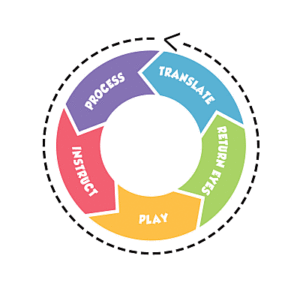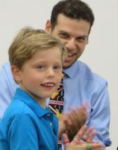Occupational Octaves: …as a Pianist with ADHD
In this fast advancing world with such great challenges for young people with ADHD out there, I see the human mind is the most important topic at hand – not the teacher, the original language of music, nor any upcoming performance. Tim Ferris once said about diet and exercise “You don’t need better genetics or more discipline. You need immediate results that compel you to continue.” Young people with ADHD need to believe in themselves. The difficulty of decoding traditional music notation as beginners may prevent them from ever knowing how great a relief it is to feel calm playing a musical instrument at a high level with an organized mind. (Lee Stockner)
Becoming a Special Needs Piano teacher and trainer is no real surprise to the people who know me, Lee Stockner, because I’ve lived life with the quandary of being a person diagnosed with ADHD who couldn’t concentrate enough in school to focus on graduating yet was able to play higher level classical piano than most other musicians around me. Attention Deficit students so commonly show flashes of brilliance along with frustrating inabilities to focus on the simplest tasks. For me personally, I’ve launched two Special Needs Piano companies, teach 30-40 students with Autism each week, have developed multiple web sites, train people around the world in my program, and published my own book series – yet I haven’t had a clean car for 5 years and the most basic pieces of paperwork that would take most people ten minutes to complete can be a full day project for me!
Having ADHD means that my stream of consciousness is constantly being interrupted by just about anything. Sounds, sights, smells, excitements, thoughts, anxieties and more can distract our minds from the simplest conversational interactions or from ingesting the information that we’re actually interested in. For me personally, my mind never turns off – there’s ALWAYS music playing. If you’re speaking to me, I can be looking directly into your eyes but have a song running through mind in a way where I don’t hear a single word you’re saying. If I discover the simplest nuance in a song that I hadn’t previously noticed, it can take over my curious mind for days! Classical musicianship from a young age helped shape this by exposing me to the complexity and fine detail of it all.
I realize now as an adult that I was so drawn to music because it was what felt like the only time my brain was working with clarity, smoothness, calmness and total comprehension. Understanding the original language of music and having this talent was my gift to combat ADHD because the failures that accompany a diagnosis like this very frequently lead to depression, and I was not spared that fate. Depression is what happens when your stream of consciousness is overtaken by negativity.
Full engagement at the piano in a way that positively and productively takes over your stream of consciousness is one of, if not the strongest, way for me to overcome periods of depression using music. To me, this means that if I was using listening to music for treating depression, it would not have been nearly as effective as actually playing music through my own body and mind. In order to maximize the beneficial idea of using music to take over the stream of consciousness, a process and cycle must be employed, practiced, and repeated in order to build the ability to be engaged at highly productive levels.
 I believe the Piano Circle of Cognitive Gain you see above is the actual process. It’s the very process you use when you open up a new piece of music to learn or you teach your own students. Whether or not you think about it, your mind and body go through this process with each note you read and then repeats it over and over. What you see here is one revolution through the Piano Circle of Cognitive Gain. As pianists, we’ve gone through that cycle thousands if not millions of times!
I believe the Piano Circle of Cognitive Gain you see above is the actual process. It’s the very process you use when you open up a new piece of music to learn or you teach your own students. Whether or not you think about it, your mind and body go through this process with each note you read and then repeats it over and over. What you see here is one revolution through the Piano Circle of Cognitive Gain. As pianists, we’ve gone through that cycle thousands if not millions of times!
When I see the five steps of the PCoCG, I imagine the juggler’s task of balance. Check out how much concentration is required for this task.
Juggling looks really hard, but I think playing the piano is harder. When playing the piano, we’re juggling five completely different operations that become more complicated with each challenging song we take on! I’ve come to believe that people who can read music are symbol decoders whereas people who steady the five steps above into a balanced and repetitive cycle are either musicians or on their way toward sustainable musicianship. I see steadying those five steps about much more than musicianship – it is about the aforementioned flow state in which one discovers their ability to connect with an instrument.
The instrument can only sound as good as the player controlling it and vice versa. If the instrument keeps up its end of the bargain (being in proper balances such as intonation and tuning), the player can keep up his/her end (being in proper balance of the steps needed to read/play). When the player can be not only balanced with the PCoCG but balanced with the instrument itself, the “Zen” mindset that an artist or athlete finds him/herself will root back to following certain steps as the underlying priority that can lead to the maximization of the experience. As most musicians who have achieved at a high level will agree, the feeling is absolutely incredible!
I imagine that this “Zen” or flow state is where some of the most real benefits of musicianship lie. If happiness is felt upon the release of chemicals and hormones in our bodies, is it possible that more is released upon more concentrated levels of engagement in whatever circle of cognitive gain one is engaged in? If the brain is a muscle, is this process what actually mines a stronger mind through musicianship? I challenge you to imagine achieving it without the steps of the PCoCG being in balance with each other.
In my case as someone with ADHD, being able to engage in this process can be used to take over my stream of consciousness and give me the relief of a smooth, thoughtful, and engaged mental/physical experience. The importance of doing this in an uninterrupted way is crucial to the outcome of the five repeated steps becoming music. Would you have ever developed the skills and happiness of a musician if this process was constantly interrupted?
If you don’t mind, I’d like to present a drastic example to stress my point; a musician who develops Parkinson’s disease may still be able to translate incredibly difficult music, process the instructions and send those instructions to his/her fingers, yet this person won’t be able to handle actually playing due to a lack of control of the hands. Sadly, this is a person who can no longer experience the full gains of musicianship because the ability to steady the hands at the piano is crucial! This idea brings up me to the next question. Which is more important – the actual decoding of traditional music or actually engaging in the Piano Circle of Cognitive Gain, of which translating it one of the five steps?
Being a pianist, I can imagine one of your first thoughts – ‘I don’t look up and down between each and every note!’ You’re right. Neither do I. But, when we began, we all did until we got really good at reading that single note. Each one of these cycles through the PCoCG is what I call a micro-goal and when we eventually become efficient enough at playing using the PCoCG, we expand our skills by reading two notes per PCoCG cycle.. then a measure.. then a full phrase.. then a full line, etc. These combinations of micro-goals will eventually turn into a song when connected with fluidity, which is always the macro goal. There will be a future blog which completely addresses the idea of micro and macro goals in both Special Needs and Traditional piano lessons through the scope of the PCoCG.
Thinking about piano lessons through the scope of the PCoCG applies to all lessons, not just special needs lessons. Take a look at the PCoCG and tell me if you can remove any of those steps from you or your students’ reading/playing and still do what you do. If the answer is no, then I hope you’ll join me in the exploration of this idea as the highest priority of music education!
Being able to engage in the PCoCG is the difference between someone who knows how to play the music they read and someone who can identify notes and beats, but can’t turn them into song. If you want to have a student for 10-15 years and bring them into the heights of musicianship, can you do so without engaging in that process? I believe the answer is no, which means that whether you’re teaching a Special Needs lesson or a traditional lesson to prepare a student for a Juilliard audition, it all falls apart if any parts of the PCoCG are interrupted.
As someone with ADHD, I can tell you that organization is very difficult for us but the organization of properly reading notes and turning them into music engages the mind and body in a way that can absolutely light up the soul! I feel better in life when I play. I feel calmer when I play. I believe that the Piano Circle of Cognitive Gain, or the Guitar Circle of Cognitive Gain, or the Flute Circle of Cognitive Gain, etc., is the core process to build upon to lead to that soulful engagement of musicianship. Now, as the creator of a #SpecialNeedsUserFriendly #NewLanguageOfMusic, my greatest pride comes from the moments when I bring severely disabled individuals into the engagement and mental relief of Piano Circle of Cognitive Gain, even if they can’t read traditional notation.


